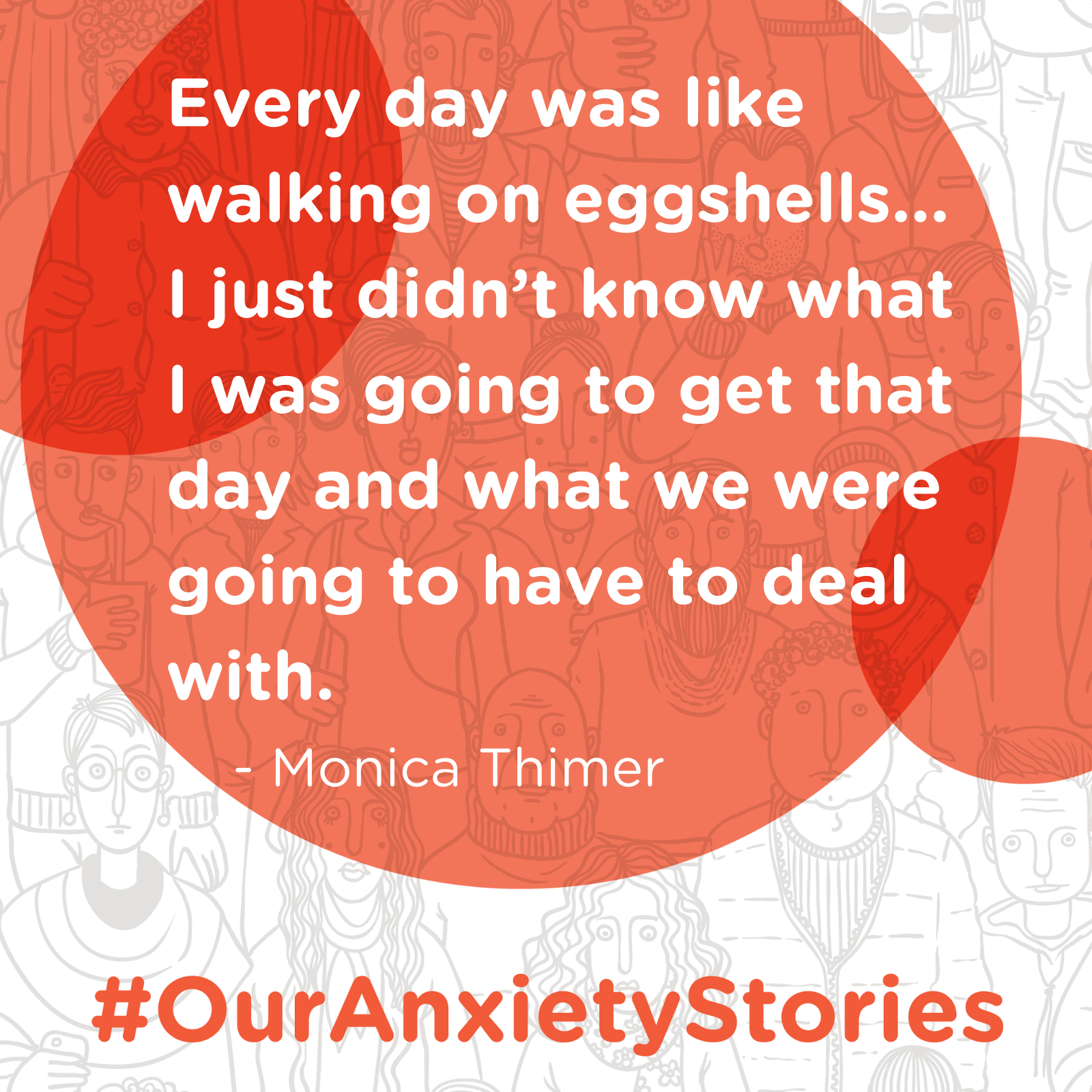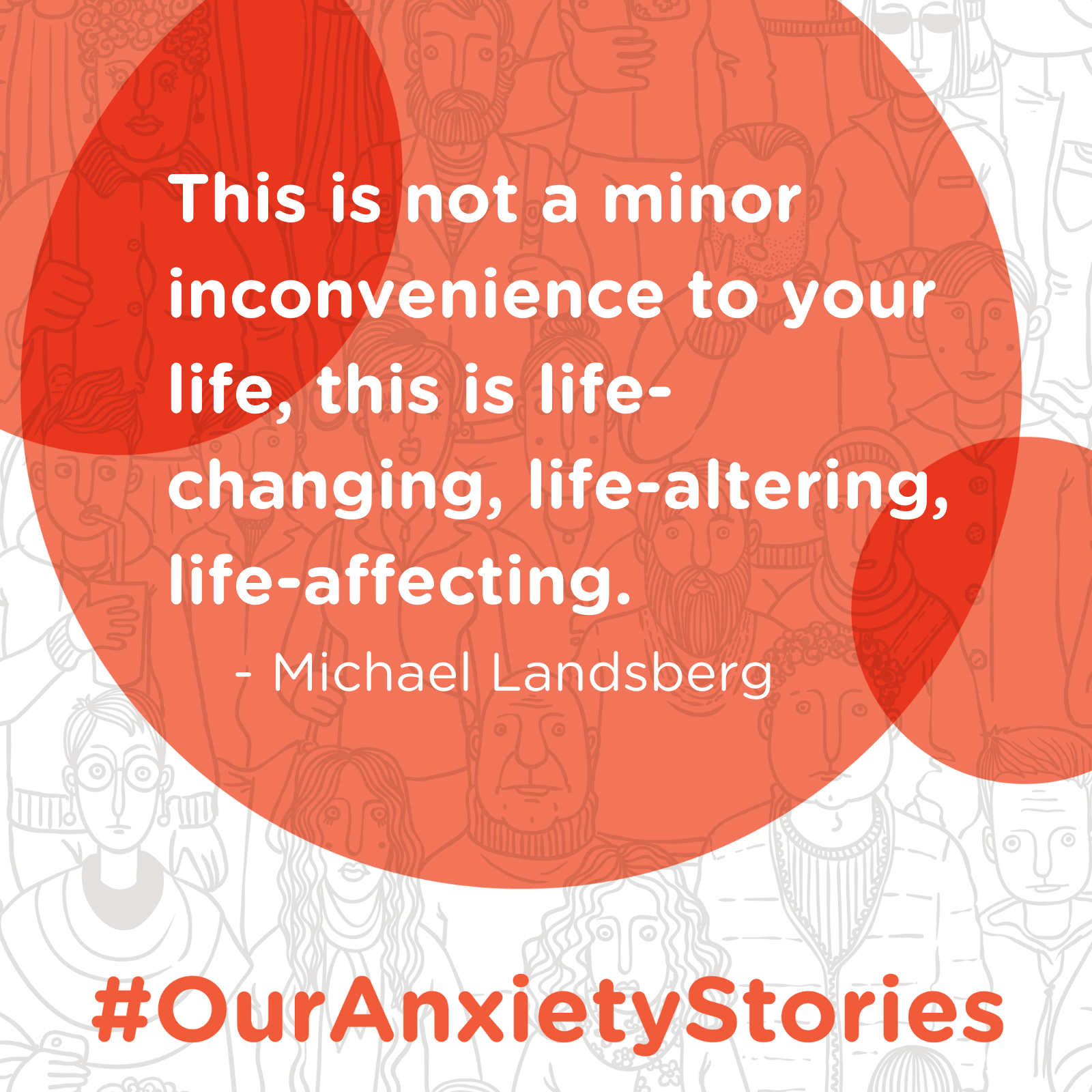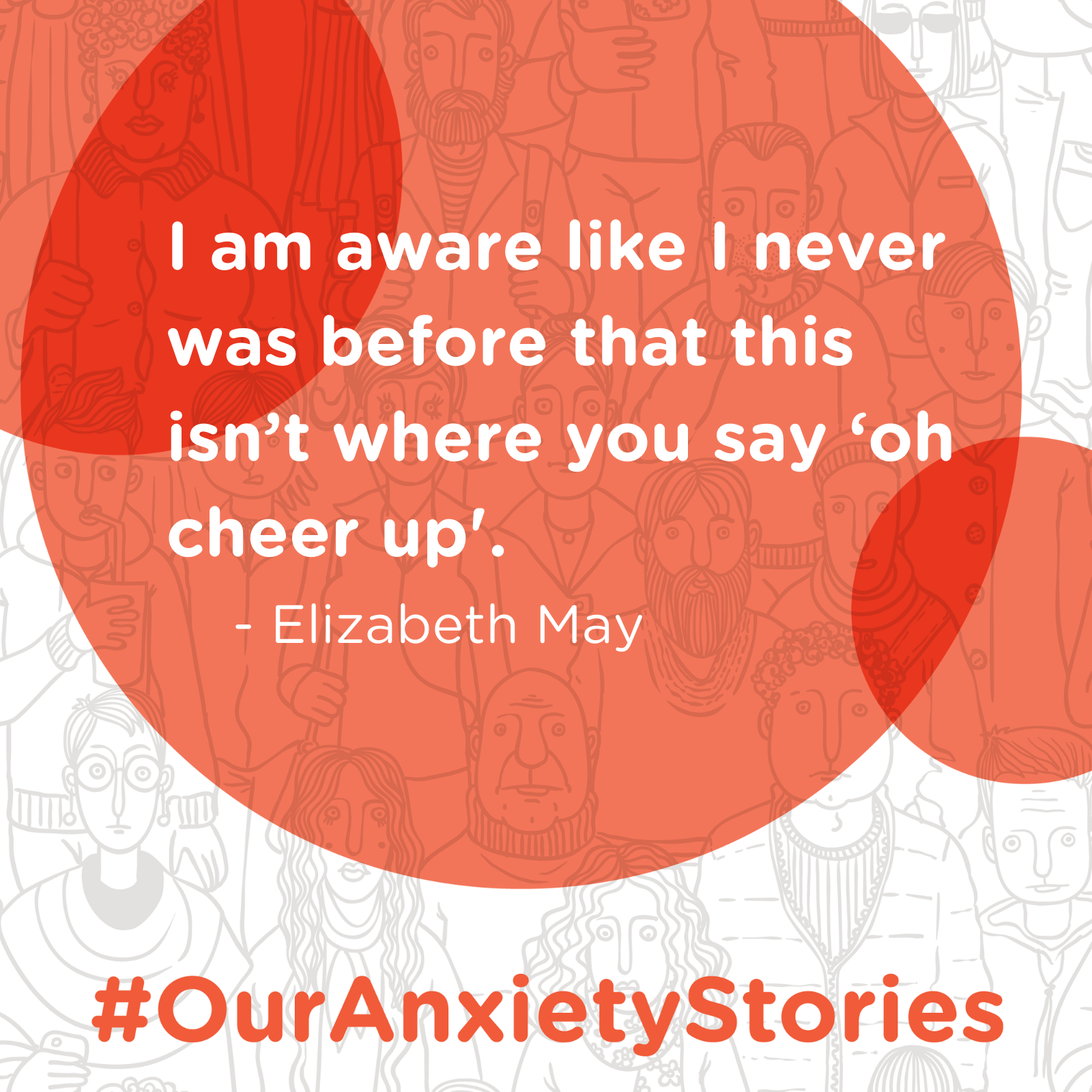Episode Transcript
Speaker 1 00:08 You are listening to our anxiety stories, the anxiety Canada podcast with John Bateman, checkout anxiety, canda.com for more totally free anxiety resources, including our app shift at CBT
Speaker 0 00:22 <inaudible>,
Speaker 2 00:25 uh, advisory committee member for anxiety Canada. Um, can you tell me your anxiety? Uh, story?
Speaker 3 00:33 Sure. I'm Ashley. I'm not a suffer of things.
Speaker 2 00:37 That's okay. We all have stories that bring us there anyway.
Speaker 3 00:41 Yeah. And excessive amounts. But, um, what the, my link to Ang anxiety Canada and anxiety in general was I was a classroom teacher, um, quite some time ago and I used to have students that I just could not figure out why they were struggling so much. They were smart, they were just the coolest kids on earth. But, um, when there would be something unexpected that happened or a big stakes test or something like that or a social problem that they didn't know how to figure out, um, these kids was shut down. And I, I just loved my job. I loved being a teacher. And, um, some of these kids was third hovering around my office after the school day or they more likely show up before the school day. And so I was getting to school earlier and earlier to prepare and I ended up not preparing and just I'm talking to these kids. So I figured out, you know, there's something here that, um, I really need to get more training in. So then I went and I, um, got my master's degree and then I got my PhD and, um, uh, I decided to go with what was, seemed to be the most, um, pressing problem of schoolkids today. And that was the anxiety concerns. So when I came to Canada, um, doctors, Peter McClain and Maureen whittle had started anxiety BC and they said, Hey, how would you like to be the president?
Speaker 2 02:08 Yeah, of course not.
Speaker 3 02:10 Well we think it'd be pretty good because you don't mind speaking to a whole a wide variety of people, which I don't. And you're pretty organized, which I am. So I was happy to step into that role. And, um, I've been working with anxiety BC now anxiety Canada for the last 20 years.
Speaker 2 02:30 That's incredible. So you were, you were kind of very close to the founding of anxiety Canada if not right there. Okay.
Speaker 3 02:38 Um, right. Pretty much right there from this, from the very first month and a coincidentally at the same time, the, um, the other provincial groups that were active at the time. So there was Adam and Manitoba, I believe you've had some guests on from there. Um, and at dot. And Quebec, uh, uh, uh, friendship seeking anxiety and um, Hmm. Ontario. So the four provinces decided, well, maybe we should get together and try to go across Canada and consolidate our efforts. So at the same time that anxiety DC was starting anxiety disorders association of Canada also coincidentally started. So I was, um, our provincial rep to them. And, um, we've all pretty much been under the same mandate to really get the word out about anxiety because anxiety masquerades as all these other things. People really don't know what's happening to them. People are pretty freaked out when it does happen to them or their child. And, um, hopefully if we've made some big inroads, I mean I see you're very handsome face here and you've been so clever all day with all these interviews and it's just so exciting to be part of this.
Speaker 2 03:45 Yeah, well I'm excited that you're a part of it because you're, you know, you're this, you know, what you're seeing is, is kind of where this, where anxiety, British Columbia has progressed to. Um, so, and I know you're still active with anxiety Canada, so you're definitely one of those key players with anxiety Canada, which is fabulous. Um, dent. Now in the beginning you said you were a teacher, you are a teacher. Now I didn't quite get what like what level you were teaching. Were you, you were teaching, were you teaching just standard curriculum? What were you teaching at that point?
Speaker 3 04:17 Yes, I was teaching, uh, at a rural school grades seven through 12.
Speaker 2 04:21 Yeah.
Speaker 3 04:21 And so, um, I, I taught language arts and social sciences. Um, but it was really the kids who made the difference, you know, in a teacher's life, you know, so I'm just really, really, really loved being a classroom teacher. But right away I knew I didn't have enough information. I didn't know what this was. I didn't know how to help. Then the more I started, um, delving into this, I started understanding that one, well wait, there's some really useful things that especially teachers can teach their kids, um, on a daily basis that's really going to help kids manage this excessive amounts of anxiety. And of course, I was starting with preteens and teenagers. Um, and then over over my career I've, um, uh, figured out that, you know, the, the skills that we teach adults, the skills we teach adolescence, he can also teach the youngsters. So they're the same skills. You just don't use them a little bit differently with, with no matter who was having a difficulty learning to manage this anxiety.
Speaker 2 05:21 Yeah, definitely. I mean, what, what you, you know, your realization, uh, how many years ago would that have been that you, you know, without, we don't want to date anybody. I don't want to get into that. But you know,
Speaker 3 05:34 <inaudible> was 1980, if you can believe it. Yeah.
Speaker 2 05:37 Okay. So wait a second. So that to me, there's some visionary stuff going on there because I grew up in, you know, I was born in 1968 so in 1980 I was 12 years old. I forget what grade that means. I'm in. Um, that means I'm in grade six, so grade seven, Oh my gosh. Like the, you know, one of the Heights, my anxiety, you know, great. Seven and the people I was dealing with, my teachers, no, nobody seemingly had a clue. And, and I still have a lot, you know, I don't want to be too critical. Um, more so now teachers are getting into this and it's not necessarily their fault either because there's all kinds of different things involved in terms of, you know, funding and uh, and, and making room for mental health as being in the, in the school system. But in 1980, that's baffling to me that you made that realization because you must've been part of the very few that had that realization or that had the, the impetus to, to, to move in that direction.
Speaker 3 06:36 Well, um, John Bateman, I feel like I was just so super duper lucky because I was at a rural school, so I, the teacher student ratio was much, much smaller. And them I really got to know these students. Um, more on a really individual level, even though I've had what we call six different preps, that means I taught six different classes throughout the day. Um, which is kind of exhausting just doing that. But, um, because of that, I could see how kids would be really thriving in one place where they really felt secure and confidence. And maybe in another subject I was still the teacher for a different subject and they would really be struggling. And it just, it didn't add up. And I really, I just really adored these kids they can to just to adore the kids with all my work. But, um, I really felt lucky that I had the opportunity to really figure out, um, my role and their role and some of the things that I just, um, inadvertently did really seem to help make them be more calm.
Speaker 2 07:36 Yeah. Yeah. It's yeah, that's, I mean, that's such an important thing because with me it was, I definitely was not common. I experienced panic attacks in class because of my teachers, you know? Oh yeah. My teacher, my, I had a teacher who basically said, yet the world's gonna end by nuclear war in the next 10 years. Um,
Speaker 3 07:57 yeah, I think sometimes teachers think is pretty funny and I just, I don't understand that it did. To me, it shows a bit of their, their own vulnerability, you know, that they're feeling out of sorts with themselves. They don't know how to help this child. So instead of being compassionate, they better be a bit antagonistic or challenging. And that's not really what's needed at that point in time as you know. Um, but I think for what you said before that most teachers are, um, and I, well I don't, I don't know, I don't know if I want to say most teachers, but some of the data show us that teachers really are starting to understand that the social and emotional stability of a child directly is linked to how they're doing academically. And we, we know the same is true of, um, principals around the world and the latest, uh, survey that they gave him that everybody, the adults in schools are starting to understand that, you know, really there, there's a big link here for how a child comes prepared emotionally and um, um, their anxiety levels have a lot to do with whether or not this is going to be a successful day academically.
Speaker 2 09:00 Yeah. And so how do you see, how do you see it currently in terms of, you know, mental health being addressed in, in the public school system?
Speaker 3 09:10 Well, um, you know, I'm, I'm out, I'm probably just going to go back to, to the, uh, the data and the data show that seven out of 10 teachers are saying, Hey, you know, we would really like to have more training. This is across Canada. So these are just a Canadian studies. We'd really like to have more training in this cause we know it's a problem. We're reporting it as our number one stressor in our job. Um, but there's very little teacher training going on. If you look at Canada as a whole, and IBC, um, is quite different because BC has been on this with educators for the last 20 years. But I would say if you go to Saskatchewan or, um, I know your previous caller is out in Nova Scotia, um, and they've got a, they've got a terrific research facility out there, but I'm not sure if this is translating to people on the ground, such as teachers, people in the trenches, um, that and school nurses if we had them. We're social workers. So I think that we've got a really big challenge here to get the word out, uh, because this is really the, the most preventable, uh, mental health problem we've got and the, um, skills to attack it or are, you know, readily available. We know exactly what to do, how to help kids, how to help adolescents, how to help adults.
Speaker 2 10:29 Yeah. Yeah. So it's just a matter of <inaudible> and we, we've got about a minute left, but, uh, do you think there's, we still have to go a ways in terms of funding these programs in public schools.
Speaker 3 10:42 You know, if, um, we want to really get me on a high horse, I think this is exactly where we should be starting. Um, you know, we have a tendency to, to put money, um, large amounts of money after the problem occurs. And for anxiety concerns especially that's where we should be putting all of our money cause it has so many downstream links to, um, higher rates of depression if you don't get anxiety treatment, higher rates of using tobacco, higher rates of um, using, uh, disability dollars, higher rates of alcohol abuse. So it all starts with that core nugget, the foundational concern of people just being too anxious and being very freaked out about it, not knowing what to do about it. And, um, if we really started with anxiety is this foundational approach with our dollars, then I think that as a society we'd have a much healthier economy, a much healthier, uh, family life, much healthier and happier children.
Speaker 2 11:35 Yeah, definitely. Well, I mean, personally, I appreciate all the work you do. Um, my inner child appreciates all the work you do, and I'm definitely anxiety Canada would not be, would not be what it is without you. So I'm really happy that you're able to join us today. It's been very valuable for us.
Speaker 3 11:54 Well, thanks so much for having me, John, and I think you've just done a terrific job with this. Thanks so much. Thank you. I appreciate it. Take care. Bye. Bye. Bye.


